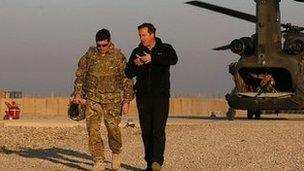Signs of progress in Afghanistan?
- Published

It is traditional for prime ministers to visit warzones before Christmas
Dateline: Helmand Province.
For the last eight years or so I have spent part of my Christmas visiting war zones with a prime minister.
It used to be Iraq with Tony Blair. Today it is Afghanistan with David Cameron. And on each occasion I have been told how well things are going.
The training of Iraqi/Afghan troops and police was always moving apace. There was inevitably lots of shiny new kit and more money to announce.
Morale was up, corruption was down and democracy of a sort was spreading throughout the land.
So after 11 years of British involvement in the latest Afghan conflict, the 438 British dead, the many more gravely injured, I am naturally cautious of optimism.
Buzzing
And yet today there are straws in the wind that perhaps the mood is changing in Afghanistan.
As evidence, let me point to what one very senior commander told me. In the town of Gereshk, one of the biggest towns in Helmand, the bazaars and markets are busy and buzzing in a way that has not been seen for years.
Extraordinarily, he said, even two car dealerships had just been set up. All this in a town where until pretty recently it had been too dangerous to trade.
It was, the commander said, not just a sign that the insurgency had been pushed out of the towns and into the desert, but also sign of confidence in the future, that elusive optimism that for years has been in such short supply.
Yes, the insurgency had not gone away. It was weakened not defeated, he said. And it would come back in the spring. And yes, the Afghan army still had a long way to go to be able to give itself effective air cover, artillery support, and medical evacuations.
'Compromises'
But despite that, there was a sense of control. He felt in control of the situation, of the drawdown of British forces for which he was responsible, calibrating step by step the gradual handing over of power, village by village, patrol base by patrol base.
He said the Afghan commanders felt in control of what they were up to, not rushing their fences, but gradually accumulating competence and confidence. Even the local Afghan people felt more in control of their own lives.
And that is the point. The withdrawal from Afghanistan will not be perfect. There will be, in the words of the defence secretary, "messy compromises". The process will leave British troops at their most vulnerable, as the chief of the defence staff said on Monday.
The insurgency will still be there after 2014. But if the military feel they are leaving in an ordered way that gives the Afghan forces the best chance to maintaining security, they will be content.
Much could still go wrong. The insurgents could come back hard. British casualties could "spike" - horrible word - as they become increasingly less able to protect themselves. The Afghan army could collapse under the pressure when they can no longer rustle up NATO air support.
And yet, if Britain can leave without being accused of cutting and running, abandoning Afghanistan to its fate, then military commanders will be satisfied.
So too will David Cameron. There are few political upsides for the end of a long conflict of which much of the public has tired. But if it all goes wrong, the political fallout could be huge.